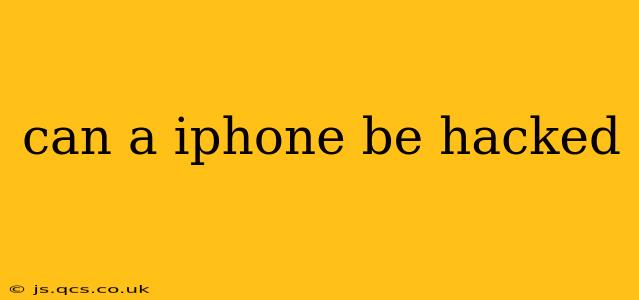The short answer is yes, an iPhone can be hacked, although it's significantly more difficult than hacking an Android device. Apple invests heavily in security, making iPhones a relatively secure option compared to other smartphones. However, no device is completely impervious to hacking. Understanding the vulnerabilities and how to mitigate them is crucial for maintaining your privacy and data security.
This guide will explore the various ways an iPhone can be compromised, the potential threats, and importantly, how you can protect yourself.
How Can an iPhone Be Hacked?
Several methods exist for hacking an iPhone, though none are foolproof and often require significant technical expertise or access to sophisticated tools. These methods include:
-
Phishing Attacks: This is perhaps the most common method. Hackers send deceptive emails, texts, or messages that appear legitimate, tricking users into clicking malicious links or downloading infected files. These links can install spyware, steal credentials, or grant access to your device.
-
Malware: While less prevalent on iOS than Android, malware can still infect iPhones through unreliable app stores, jailbroken devices, or compromised websites. Malware can steal data, track your location, and even control your device.
-
Jailbreaking: This process allows users to bypass Apple's security restrictions, granting access to the operating system's core files. While offering customization options, jailbreaking significantly increases your vulnerability to malware and hacking attempts. It's strongly discouraged unless you have a deep understanding of security risks.
-
Zero-Day Exploits: These are vulnerabilities in software that are unknown to the developer. Exploiting these flaws allows hackers to gain access before a patch is released. These are rare but extremely dangerous.
-
Physical Access: Gaining physical access to your phone opens the door to a range of hacking possibilities, including installing spyware or bypassing passcodes.
-
SIM Swapping: This involves tricking your mobile carrier into transferring your phone number to a SIM card controlled by the attacker. This grants them access to your accounts linked to that number, like two-factor authentication.
What are the Risks of an iPhone Being Hacked?
The consequences of a successful iPhone hack can be severe, including:
- Data Theft: Hackers can steal personal information, photos, financial data, and other sensitive details.
- Financial Loss: Access to your accounts can lead to fraudulent transactions and financial losses.
- Identity Theft: Stolen personal information can be used to assume your identity, leading to various legal and financial problems.
- Stalking and Harassment: Hackers can track your location and monitor your communications.
- Device Control: In extreme cases, hackers might gain complete control of your device, deleting data or installing malicious software.
How to Protect Your iPhone from Hacking
Fortunately, there are many steps you can take to significantly reduce the risk of your iPhone being compromised.
Enable Two-Factor Authentication (2FA): This adds an extra layer of security by requiring a code from a second device, making it much harder for hackers to access your accounts even if they obtain your password.
Keep Your Software Updated: Apple regularly releases software updates that patch security vulnerabilities. Ensure your iOS, apps, and other software are always up-to-date.
Use Strong Passcodes and Passphrases: Avoid easily guessable passwords. Use a long, complex passphrase or a strong password manager.
Download Apps Only from the App Store: Avoid downloading apps from unofficial sources, as these can contain malware.
Be Wary of Phishing Attempts: Don't click suspicious links or open attachments from unknown senders. Verify the sender's identity before interacting with any email or message.
Avoid Public Wi-Fi: Public Wi-Fi networks are often unsecured, making your device vulnerable to hacking. Use a VPN for secure internet access when using public Wi-Fi.
Regularly Back Up Your Data: Regular backups allow you to restore your data if your device is compromised.
Are iPhones More Secure Than Androids?
Generally, iPhones are considered more secure than Android devices. Apple's tight control over its ecosystem and stricter app approval process contribute to a more secure environment. However, both platforms have vulnerabilities, and security depends heavily on user practices.
Can a Jailbroken iPhone Be Hacked More Easily?
Yes, jailbreaking significantly increases the risk of your iPhone being hacked. It removes security restrictions, making your device more susceptible to malware and other threats.
By following these security best practices, you can dramatically reduce the chances of your iPhone being hacked and protect your valuable data and privacy. Remember, vigilance and proactive security measures are key to maintaining a secure digital life.
